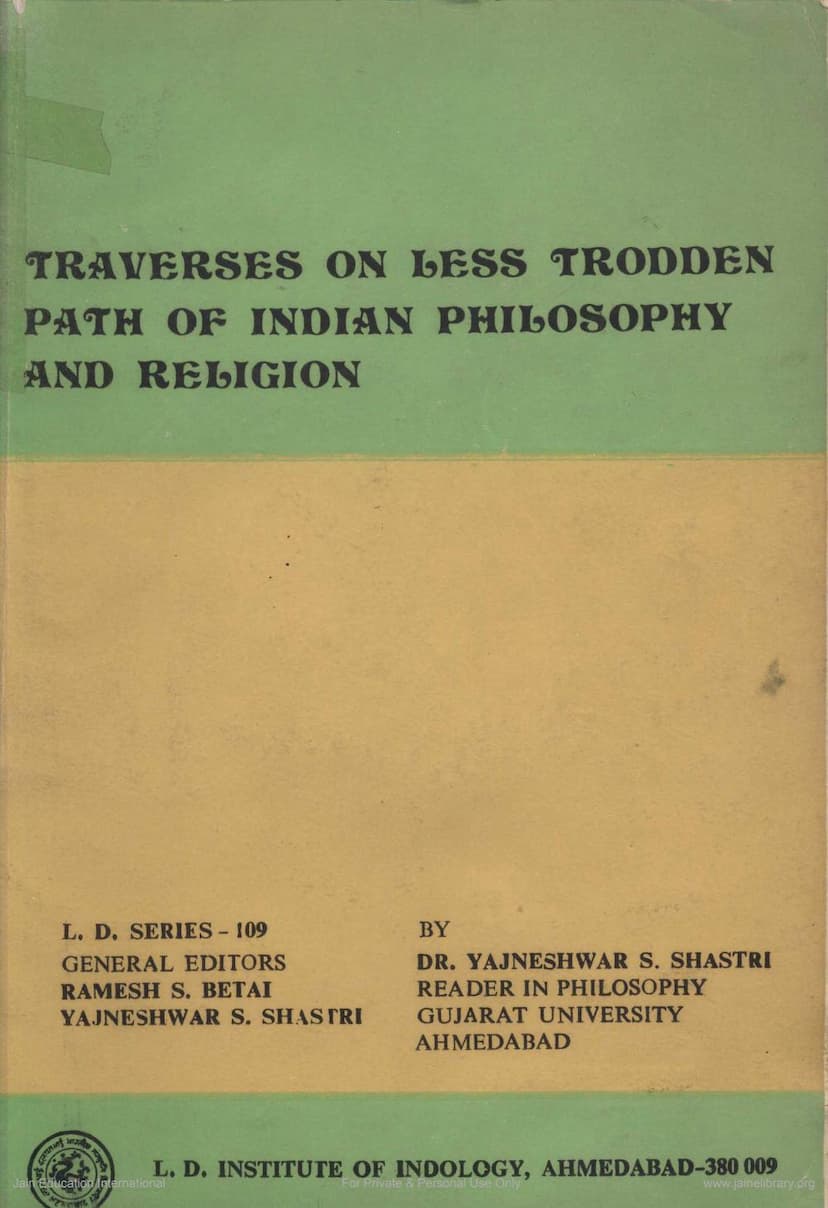Traverses On Less Trodden Path Of Indian Philosophy And Religion
Added to library: September 2, 2025
Loading image...

Summary
The book "Traverses on Less Trodden Path of Indian Philosophy and Religion" by Dr. Yajneshwar S. Shastri, published by L. D. Indology Ahmedabad in 1991, is a collection of twenty-two research papers that explore various less-discussed aspects of Jainism, Buddhism, and Hinduism. The author, a Reader in Philosophy at Gujarat University, bases his work on the study of original Sanskrit texts.
The papers delve into a range of subjects, including:
-
Jainism:
- The contribution of Jaina thinkers to reconciling divergent philosophical viewpoints through the doctrine of Anekāntavāda (doctrine of manysidedness of reality), which encompasses Nayavāda (doctrine of standpoints) and Syādvāda (theory of relativity of truth).
- The refutation of Advaita Vedanta by Jaina philosophers, criticizing its core doctrines like the non-dual Brahman, Maya, and the nature of the Self and liberation.
- The significant contributions of Umasvati Vācaka to Jain philosophy, highlighting his foundational works like Tattvārthaṁigamasūtra and Praśamaratiprakaraṇa.
- The doctrine of degrees of reality in Jainism, comparing it with Buddhism and Vedanta.
- A study of commentaries on Umasvati's Praśamaratiprakaraṇa and a comparative analysis of Praśamarati and Tattvārthasūtra, suggesting Praśamarati is also by Umasvati.
- The mystical side of the versatile Jaina philosopher Yasovijaya.
- Jaina philosophical concepts like Existence (sat), Substance (drayya), qualities (guņas), and modifications (paryāyas), comparing them with Nyāya-Vaiśeșika and other systems.
- The philosophical argument that Jainism cannot be classified as a heterodox (nāstika) system simply because it rejects the Nyāya concept of God as the creator.
- The criticism of Materialists (Cārvāka) by the Jaina philosopher Vidyānandi.
- The Jaina concept of Ātmabodha (self-awareness) or Ālocanā (self-confession) by Padmanandi, emphasizing confession of faults and the role of devotion.
- The Jaina understanding of voluntary deaths, contrasting them with suicide, particularly the concept of Sallekhanā.
- The code of conduct for monks and householders in Jainism, with a special focus on Praśamarati, outlining principles like Right Faith, Knowledge, and Conduct, and the complex system of meditation and virtues.
- The foundational definition of reality by Umasvati, emphasizing production, destruction, and permanence, and its link to Anekāntavāda.
- The Jaina conception of substance and existence, characterized by origination, destruction, and permanence, and its comparison with modern scientific ideas.
-
Buddhism:
- The historical personality and Mahāyāna affiliation of Nāgārjuna, countering scholarly doubts with textual analysis.
- The conception of Māyā (illusion) in Asanga's Vijñānavāda Buddhism, contrasting it with Advaita Vedanta and exploring its role in explaining the phenomenal world.
- The conception of reality in Mahāyāna Buddhism, particularly the idealistic standpoint of pure consciousness, and its comparison with Upanishadic thought.
- The conception of Nirvana in Asanga's Vijñānavāda Buddhism, highlighting its positive nature as self-realization and the removal of ignorance and obscurations.
- The influence of Upanishadic thought on Asanga's Mahāyānasūtrālankāra, evident in his concepts of the Absolute, phenomena, ignorance, and liberation.
- The concept of Alayavijñāna (storehouse consciousness) in Vijñānavāda Buddhism, discussing its role as the seed of phenomena and its comparison with Lankāvatāra Sūtra and modern psychology.
- The Buddhist view on the doctrine of degrees of reality, distinguishing between conventional (Sammuti) and real (paramārtha) truth.
-
Hinduism and Comparative Philosophy:
- The refutation of Advaita Vedanta by Jaina philosophers, arguing against the non-dual Brahman and Maya.
- The doctrine of degrees of reality in Jainism, Buddhism, and Vedanta, tracing its roots to the Upanishads.
- The philosophical and practical aspects of Tripura Tantra (Śrī Vidyā) within Śākta Agamas, emphasizing its Advaitic underpinnings and the path of Sadhana, including internal worship and the Sriyantra.
- The place of suicide in Indian culture and religions, analyzing the condemnation of ordinary suicide versus the acceptance of voluntary deaths for religious or noble causes (like Mahaprasthana, Prayopavesana, Sati, Jauhar).
- The influence of Upanishadic thought on Mahāyāna Sūtrālankāra, particularly on concepts of the Absolute, Maya, truth, and liberation.
- A comparative study of the conception of Nirvana in Mahāyāna Buddhism, contrasting it with Hinayāna and identifying similarities with Upanishadic and Advaitic ideas of liberation.
- The philosophical underpinnings and sadhana (practice) of Tripura Tantra, emphasizing the worship of Sakti as the Supreme Brahman and the path of realization of Advaita.
- A comparative study of the concept of Ālaya-vijñāna in Lankāvatāra Sūtra and Asanga's Vijñānavāda.
- The philosophical concept of Anekāntavāda, its reconciliation of different viewpoints, and its presence across various Indian philosophical systems.
- A philosophical examination of the concept of reality in Mahāyāna Buddhism, particularly the idealistic views of Nagarjuna and Asanga.
- The philosophical significance of Naiṣadhīyacarita by Sri Harsha, highlighting its mastery of various sciences and its poetic brilliance, often referred to as "Vidadvā oṣadhaṁ" (medicine for the learned).
- The philosophical and religious aspects of Ātmabodha (Alocana) by Padmanandi, a mystic Jaina saint, exploring themes of self-realization, confession, and devotion.
- An analysis of the classification of Āstika and Nāstika philosophies in Indian thought, arguing that Jainism, despite common classification, is fundamentally Āstika due to its acceptance of Atman and karma.
- A discussion on the philosophical nuances of Anekāntavāda, its interpretation through Nayavāda and Syādvāda, and its reconciliation of differing philosophical perspectives.
The book is intended for scholars and students of Indology, Philosophy, and Comparative Religion, offering insights into the less-explored territories of Indian philosophical and religious thought.